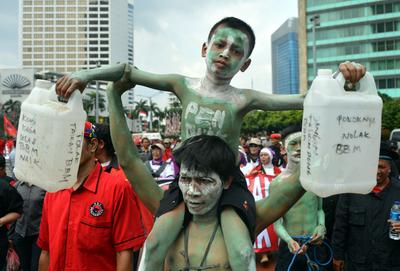Indonesia’s economy is the 16th largest in the world. Natural resources and commodities, such as oil, gas, coal and crude palm oil (CPO) — making up around 50 per cent of Indonesia’s exports — have contributed significantly to its strength. Indonesia’s energy supply, employment and food security rely on these resources.
Indonesia has pushed the production of coal and gas energy sources in recent years — not only for domestic consumption but also for meeting export demand. At times, the proportion of coal exported exceeded 90 per cent from 2007–09, according to the Energy and Mineral Resources Ministry.
Indonesia’s employment also relies on natural resources. The forest-related sectors employed a total of 3.76 million people — 4 per cent of Indonesia’s working population — according to the 2011 International Trade Strategies Report. Forest commodities also contributed roughly 3 per cent to the country’s GDP. In 2010, agriculture accounted for 38.3 per cent of total employment in Indonesia.
Since its economy recovered from the late-1990s financial crisis, Indonesia has experienced stable growth and maintained its real growth performance — averaging above 5 per cent from 2000–11, as reported by the World Bank.
A big question remains: can the country maintain strong growth and support the population’s livelihoods when these resources are extremely degraded or depleted?
In the mid- to long-term, resource depletion will hurt the country’s economy domestically.
Oil subsidies have already caused some damage. Indonesia has become a net importer of both crude oil and refined products since 2004. Oil consumption has been heavily subsidised, costing the government Rp306.5 trillion (US$31.5 billion) in 2012 — much higher than in 2010 (Rp139.9 trillion or US$14.4 billion).
To address this issue, the Indonesian government and parliament approved a government budget that increased the price of a litre of petrol by 44 per cent and diesel by 22 per cent in 2013 . This intervention may have helped the government’s budget deficit — but even after the price rise the deficit is still expected to reach 2.4 per cent of GDP, up 1.8 per cent on 2012.
In 2012, the Vice Minister of the Energy and Mineral Resources Ministry stated that high energy consumption could accelerate the imbalance between the exploitation of fossil energy resources (such as oil, gas and coal) and the speed of inventing new reserves — leading to a depletion of Indonesia’s reserves and increased dependency on imported energy.
Other economic costs exist in the form of environmental degradation.
Destructive, illegal and uncontrolled resources extraction in forestry, agriculture, mining and fishery sectors has led to environmental disasters such as droughts, floods and landslides that adversely affect agricultural production. This impacts the local economy and the balance of trade and the current account — potentially upsetting Indonesia’s macroeconomic equilibrium.
According to the Agriculture Ministry, more than a million hectares of the country’s paddy fields and more than 100,000 hectares of corn fields have been impacted by diseases, floods and drought in the period of 2007–11. If production losses are not dealt with, Indonesia may face difficulties in ensuring food security for its people. Even if such losses are compensated through imports, similar imbalances may surface in other areas, as dependency on foreign agriculture commodities would increase.
So, it is important to continue reforming Indonesia’s natural resources management. Indonesian presidential candidates and parties should be reminded that Indonesia’s economy could be in jeopardy if its current and future economic platforms lead to further resource depletion and environmental degradation.
It is time for the Indonesian people to demand better natural resource management and environmental protection from their politicians and leaders — for the future of their economy and livelihoods.
Fitrian Ardiansyah is a PhD scholar at The Australian National University and the recipient of Australian Leadership Award and Allison Sudradjat Award.
A version of this article first appeared here in Coal Asia.

